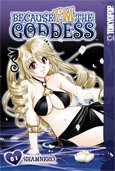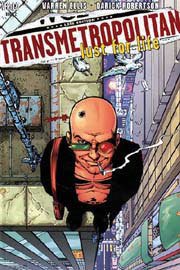
For the last few years, I have been told repeatedly by eager publishers that graphic novels are going to be all the rage here in America. A few even ventured that Japanese Manga was going to infest our stacks like Kudzu has taken over the South. I continually try to understand Manga and have come to three conclusions: all the characters' eyes are way too big for their faces, all the girls wear mini skirts that would have been scandalous in the 1960s, and somehow the genre must be related to Hebrew, because you read it backwards.
The predictions finally seem to be coming true. We are becoming graphic-novel crazy. My store is expanding its graphic novel section for the second time in as many years. Sure, it's still not as big as the mystery or science fiction sections, but it is growing steadily. I'm relieved to say that Manga is not leading the charge. People are interested in Persepolis, Sandman, Sin City and now, after the movie, V for Vendetta.
I have found some solace in these more traditional graphic novels. Superman and Batman were my heroes as a child. The Watchmen, Sandman and Hellblazer got me through my bachelor 20s. The other day, when I found myself holding a gift card, I thought it was time to update my collection. Like a kid on a limited allowance, I browsed through dozens of books an
 d finally selected the first two volumes of Transmetropolitan and the opening book of Ex Machina. I was looking for characters that I could relate to, interesting art and settings that weren't too outlandish.
d finally selected the first two volumes of Transmetropolitan and the opening book of Ex Machina. I was looking for characters that I could relate to, interesting art and settings that weren't too outlandish.Spider Jerusalem, a chain-smoking, Hunter-Thompson inspired journalist, is the lead character in the dystopian future world of Transmetropolitan. He inhabits a world that no one in their right mind would want to live in. Advertisements attack people in their dreams, and even household machines have addictions in this alien-implanting society. Warren Ellis comes up with the fantastical stories, but a team of illustrators led by Darick Robertson make his wild ideas seem real.
Transmetropolitan really takes off after Ellis has established the ground rules for his insane universe. Jerusalem's job as a columnist allows him to naturally delve into all the nooks and crannies of his city. We find out about people that download their brains into a super-computer and get rid of their bodies, we visit reservations where people are voluntarily brainwashed into forgetting contemporary society and live as Aztecs, we discover the terrible fate of those cryogenetically frozen back in the 1990s. It's a mad, mad world and I love it. No traditional novel could so readily take you into the future the way Robertson's explosive drawings do.

Ex Machina won the Eisner Award (the graphic novel equivelent of the Emmy's) for "Best New Series" last year. This book is set in our world, specifically New York City, 2002. Mitchell Hundred has retired as America's first and only super hero to become the mayor of the Big Apple. An electrical accident gave him the ability to hear machines talk and he can also give them commands. He can tell a bus to stop, he can turn off all the lights in New York City, but in the end, he was only able to save one of the World Trade Center towers on Sept. 11.
Ex Machina: The First Hundred Days starts out promisingly enough, as we are given the background story, but by the end, we are left scratching our heads as to why anyone would want to be the mayor of New York. Hundred's two main crises involve an artist who has offended everyone in the city and a serial killer who is picking off the city's snow plow drivers. Who turns in their super hero tights for that? Still, Brian Vaughan has created an interesting post-9/11 world that has some real potential, and we can only hope the mayor has an opportunity to be a little more heroic.
I can't wait to dive back into the stacks and discover what the French have known all along -- graphic novels are great fun. Also, if they are well written, like Transmetropolitan, they can become a vehicle for commenting on religion, television and other sacred cows in our society. All of this has me saying, "ooh-la-la!"






No comments:
Post a Comment